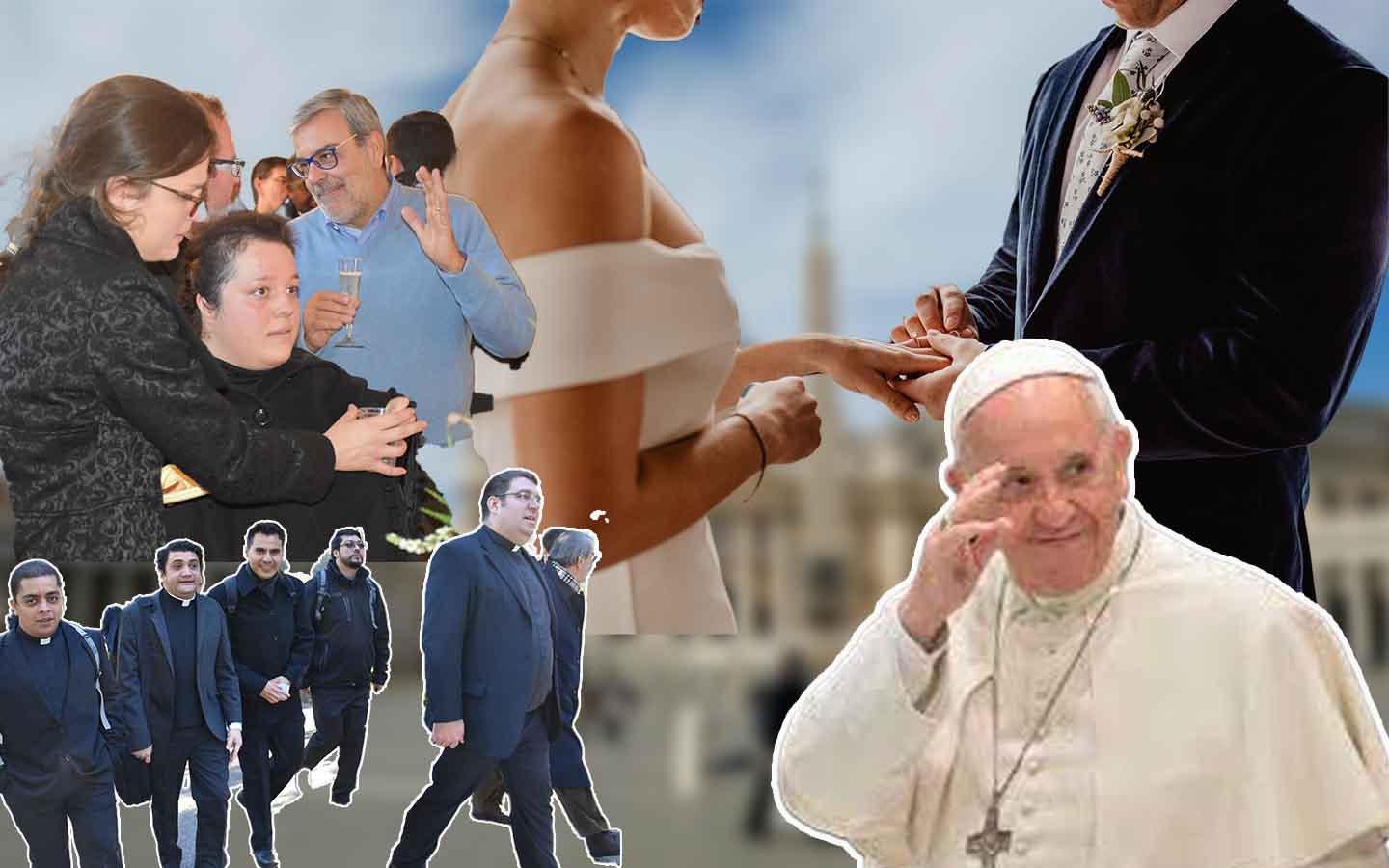Question: A man and a woman get married in the catholic Church lawfully and validly. They have a daughter too. During 5 years of marriage the difference of opinion and personality clashes increased to the point of separation. They have been living in separation for past three years. Can this marriage be dissolved?
– Joseph Jerald SJ
Answer:
A few days ago, Jerald Joseph posted me a question regarding the subsequent dissolution of a lawful and valid marriage. This question touches upon the essential properties of marriage, that is, unity and indissolubility. This is a very pertinent question and like Jerald, many of our colleagues come across it as a result of ongoing conflict and differences of opinions.
To better understand whether in such circumstances, a marriage can be dissolved or not. We shall try to respond to this question step by step in the following discussion.
However, to answer the question of Joseph, my immediate response would be that if a man and a woman get married in the Catholic Church is lawfully and validly, their subsequent separation for past three years or more will not amount to the dissolution of marriage. As per canon 1141, “a marriage which is ratified and consummated cannot be dissolved by any human power or by any cause other than death”.
What is a valid and lawful marriage?
Validity of a juridic act, i.e., in case of the marriage, refers in some manner to the juridic effect of marriage. Hence, when a marriage is valid and lawful, it entails juridic or legal effect. For a marriage to be valid, following things are required. First of all, we need to be clear that the act of entering into a marriage which is also one of the seven sacraments, is a «juridic act». About a juridic act, canon 124 §1 of the Code of Canon Law stipulates that «for the validity of a juridic act, it is required that it be performed by a person who is legally capable, and it must contain those elements which constitute the essence of the act, as well as the formalities and requirements which the law prescribes for the validity of the act».
Hence, as per canon 124 §1, for the validity of the sacrament of marriage, at least the following conditions must be true:
- Ability of the person: Ability of the person here means the legal and juridical capacity to enter into marriage, i.e., the person must have psychological maturity and must not be impeded when he or she marries. In other words, there must be absent of any diriment impediments either generic or particular as mentioned in canons 1073-1094.
- Essential elements: To be able to place a juridic act validly, the person must manifest one’s will or consent free from any vices. In the case of marriage, it the consent of the parties which constitutes marriage. As per canon 1057, a marriage is brought into being by the lawfully manifested consent of the persons who are legally capable to marry.
- Formalities: According to canon 1108, the formality of marriage must be fulfilled as per canonical norm: «Only those marriages are valid which are contracted in the presence of the local Ordinary or parish priest or of the priest or deacon delegated by either of them, who, in the presence of two witnesses, assists in accordance with the canons».
- Requisites: For the marriage there exists only one requisite for the validity, that is, as per canon 1102 §1, for a valid marriage there must not be a presence of a condition concerning the future.
In simple terms, some canonists categorically agree on the following conditions for the validity of a marriage:
- Juridical ability: Absence of impediments assuring the ability of the persons to enter into marital bond (Absence of incapacitating impediments).
- Consent of the parties: Consent given in freedom who are marrying (it is to be devoid of defect/ vitiation).
- Canonical form: Canonical form of marriage (legitimate/ lawful manifestation of consent, natural and canonical)
If any of the above conditions are not met, a marriage cannot be validly celebrated.
The notion of ratified or sacramental marriage
In order for a marriage to be a sacrament, the following two things are required:
- First of all, the marriage has to be valid.
- The marriage has to be between two baptized parties.
Example:
A) A valid marriage between two Catholics:
- Michael Jacob is a Catholic boy.
- Mary Lobo is a Catholic girl.
- They both are baptized Catholics.
- Both are of marriageable age.
- They have no impediments and prohibitions to marry as per law.
- Everything is done as per the requirements for a valid marriage.
- Marriage takes place.
We ask two questions:
- Is this marriage between Michael and Mary between two baptized? Yes.
- Is this marriage valid? Yes.
Conclusion: Therefore, by this very fact, the marriage is a sacrament.
B) A valid marriage between a Catholic and a baptized non-Catholic
- Allan Fernandez is a Catholic boy.
- Jennifer Lopez is a Methodist Girl.
- They are both baptized (One in Catholic Church, the other in the Methodist church).
- Both are of marriageable age.
- They have no impediments or prohibitions to marry as per law.
- Everything is done as per the requirements for a valid marriage.
- The marriage takes place.
We ask two questions:
- Is this marriage between Allan and Jennifer between two baptized? Yes.
- Is the marriage valid? Yes.
Conclusion: Therefore, by this very fact, the marriage is a sacrament.
In other words, it is a valid marriage between two baptized parties. Therefore, their marriage, by that very fact itself is a sacrament.
What are the other names for “sacramental marriage”?
- Christian marriage (canon 1134)
- Ratified marriage (canon 1061 §1)
The notion of consummated marriage
A consummated marriage is that marriage if after having validly entered into marriage through exchange of consent, the spouses have in a human manner (humano modo in Latin) engaged together in a conjugal act in itself apt for the generation of offspring. The canon 1061 §1 highlights once again the very ordering of nature towards this end of marriage, making the two one flesh.
A ratified and consummated marriage cannot be dissolved by any human power or by any cause other than death (canon 1141).
Therefore, in the question of Joseph, it is presumed that since the marriage is celebrated between two Catholics (i.e., baptized parties) lawfully and validly, therefore it is a sacramental marriage and will be called ratified. It is also consummated because the couple have lived together, and have exchanged conjugal relationship ordered for the procreation of offspring in humano modo, i.e., human manner. It is clear that even if the couple is living separately after three years of marriage as a result of differences of opinions, the marriage is still binding, and it cannot be dissolved.
Nature of marriage
«Nature of marriage» simply refers to the fact that marriage is a human reality. It also underlines that marriage is within the created order as something natural. It further establishes that marriage is a covenant, i.e., a contract between a man and a woman.
What are the ends of marriage?
The Code of Canon Law 1983, provides that there are three ends or finalities of marriage:
- Good of the spouses
- Procreation of the offspring
- Education of the offspring
This is different from the notion of ends of marriage given in the Code of Canon Law 1917 which stated the following ends of marriage in a hierarchical order:
- Primary end of marriage is procreation and education of children.
- Secondary end of marriage is mutual help and remedy of concupiscence.
However, in the present Code of Canon Law 1983, there is no hierarchical order in respect of ends of marriage.
Marriage as a covenant and contract
The term «contract» and «covenant» are used in one and the same sense, indeed deliberately, so that it may be clearly evident that the matrimonial covenant concerning which the Pastoral Constitution Goudium et spes speaks can be constituted for the baptized in no other way than through a contract, even if it is sui generis, i.e., a category in itself. Inseparability of marital contract and marital sacrament for the baptized is affirmed which means a valid marriage between two baptized persons is sacrament.
Marriage: For the good of the spouses explained
The Ecumenical Council of Vatican II primed the expression «good of the spouses» which is established in canon 1055 of the Code of Canon Law 1983. Canon lawyers agree that «good of spouses» is richer than mere mutual assistance and the remedy of concupiscence. It is embracing the good of the entire person, totius personae vitae.
It consists in the growth and maturing of the spouses as persons, though the aids, comforts and consolations, but also the demands and hardships of conjugal life when lived according to God’s plan.
Negatively:
- «good of the spouses» (bonum coniugum) is not to be identified with the spouses’ subjective happiness, sense of fulfilment, or achievement of personal aspirations.
- Nor is the lack of personal harmony between the spouses as a result of their differences in character, nature, perspective on life, individual sensitivity, grade of particular love.
«Good of the spouses» (bonum coniugum) is more than a communion of «heart, table and cohabitation». It is the sum of all the goods which flow from the interpersonal relationship of the spouses, which, at least as to their substance, bring about and promote the spiritual, intellectual, physical, moral, psychological and social good of the spouses. For this to happen, the spouses «must enjoy the minimum psychosexual integration, and have the capacity for and willingness to engage in genuine interpersonal communication, to establish a mutually satisfactory sexual relationship, and to establish at least a minimally “tolerable” personal relationship».
Unity and indissolubility: Essential properties of marriage
Apostolic exhortation Familiaris consortio 11 of John Paull II and Pastoral Constitution Gaudium et spes 48 speak of «unity and indissolubility» as essential properties of marriage. According to the canonical provision, essential properties of marriage are – unity and indissolubility (canon 1056). In Christian marriage, these properties acquire a distinctive firmness by reason of sacrament.
Understanding the meaning of "unity"
Unity consists in union of one man with only one woman. Therefore, it excludes polygamy in its double form of polygyny and polyandry either simultaneously or successive/ serial.
- Unity underlines an exclusive relationship between one man and one woman. Thus «to include anyone else within this privileged sphere of marital intimacy violates the unity proper to marriage».
- Thus, unity always refers to monogamous union between one man and one woman as husband and wife.
- Why polygamy is seen in direct opposition to the marriage order deriving from natural law? Polyandry impeding the determination of the father, comes in the way of the education of the children. This is true also in all cases other than polyandry. Polygyny directly stands in opposition to the very end of the good of the spouses particularly at the level of sexual relationship.
- In both polygyny and polyandry, there is a grave difficulty in what regards the realization of the partnership of spouses for the entire life (consortium totius vitae) as indicated by canon 1055 §1, because the total giving of self by a spouse is impossible if the spouse is attempting to do it in respect of many spouses contemporarily.
- Essential properties are «qualities inherent in the institution of marriage itself». This is to say that minus these properties, marriage as institution cannot be called as such. These properties inhere in any marriage independently of the will or intention of the partners. They regard all marriages, Christian and non-Christian since it is based on the natural law.
Juridical consequence of "unity"
Consent in order to have juridical efficacy has to necessarily include the property of unity. If through positive act of will even on the part of only one spouse unity is excluded, then that marriage is said to be contracted invalidly (canon 1101 §2). The positive act of will is one and the same as the act of excluding. This simply refers to an act of excluding, which means:
- Exclusivity of bond is excluded, by reserving to oneself the right of having sexual relationship with a person other than one’s own spouse. Or,
- Exclusivity of bond is excluded, by reserving to oneself the right to marry with another person while maintain the prior bond.
In the jurisprudence, it is a praxis to consider the fact that if a spouse is suffering from a grave lack of judgement concerning the essential matrimonial rights and obligations (in this case, obligation of fidelity naturally and necessarily demanded of in monogamous unions), that spouse is deemed incapable of emitting a valid marital consent (canon 1095, 2°-3°).
The validly constituted marital bond has to be both exclusive and perpetual (canon 1134). Eery attempted marriage while a valid prior bond exists is invalid (canon 1085). This is to be seen from the point of view of unity as the essential property of marriage.
Understanding "indissolubility" of marriage
«Marriage is indissoluble», meaning it is a perpetual relationship. It is forever. Indissolubility is that property for which a validly constituted marriage bond cannot be dissolved. When referred to marriage, it expresses the perpetual-ness of the conjugal bond and excludes the possibility of dissolving the bond through divorce.
Indissolubility renders the marriage bond absolute. This means in simple terms the marital bond constituted by way of the mutual consent exchanged between two person (man and woman) lasts for the entire life.
Indissolubility is twofold
According to canonical tradition indissolubility is twofold – intrinsic and extrinsic indissolubility.
Intrinsic indissolubility
Intrinsic indissolubility refers to all marriages whether the spouses are baptized or not. That is, once marriage is validly entered into, it cannot be dissolved by subsequent withdrawal of consent of the parties. In other words, intrinsic indissolubility consists in the impossibility of the dissolution of the conjugal bond be it on the part of the cause that has constituted it, that is, by the will of the one or both the parties.
It is called relative indissolubility when a marriage can be dissolved by a different external cause, like divine authority. Hence in divine name, the ecclesiastical authority can dissolve the marriage. A marriage can be dissolved if the relative indissolubility holds true under the following conditions:
- Ratified and non-consummated marriage (canon 1142)
- Dissolution of a marriage through Pauline Privilege (canons 1143-1147)
- Dissolution of a marriage through the vicarious power of the Roman Pontiff, known as Petrine Privilege (canons 1148-1149)
- Dissolution of a non-sacramental marriage «in favor of faith» (in favorem fidei) by the Roman Pontiff.
It is interesting to note that indissolubility is the essential property of all marriages, both of the baptized and non-baptized deriving from natural order. Now the question arises: «Dos the Church recognized the power of civil authorities to dissolve marriages?».
We need to know that:
- The Church does recognize the power of civil authorities to dissolve marriages.
- In light of the above, the civil divorce does not dissolve the conjugal bond even when the law so establishes it. The divorcees cannot contract a new valid marriage as long as the first marriage is still alive. In other words, unless the first marriage is not dissolved in the eyes of the Church.
- If a Catholic party has contracted civil marriage with another Catholic party, their marriage would be civilly valid but canonically invalid. This is because it was contracted without Canonical Form (canon 1108 CIC/1983). Hence, in case they want the celebration in the Church, the normal procedure for marriage between two Catholics is to be followed.
It is also important to note that the Church does not give recognition to «the power of civil authorities to dissolve marriages. It does claim that the authority, under certain conditions, to dissolve»:
- A non-sacramental marriage involving at least one unbaptized person.
- A sacramental marriage that has not been consummated.
Extrinsic indissolubility
An extrinsic indissolubility entails impossibility of dissolution of conjugal bond by a human authority, ecclesiastical authority included. Hence this is called absolute indissolubility. The current Church law considers only sacramental marriages that have been consummated to be extrinsically indissoluble by any cause except through death.
Juridical consequences
- Excluding indissolubility through a positive act of will in the consent constituting marriage renders marriage null (canon 1101 §2).
- A validly constituted bond is perpetual (canon 1134), and by virtue of sacrament it obtains a peculiar stability/ firmness.
- Marriage enjoys the favor of law (canon 1060).
Conclusion
Having discussed the notion of marriage in the Code of Canon Law and its essential properties – unity and indissolubility – we arrive at the following conclusion of Joseph’s question. The certain man and certain woman married in the Catholic Church lawfully and validly, are still in the marital bond even if living separately. Their marriage cannot be dissolved for the reason of disagreements and differences of opinions.




